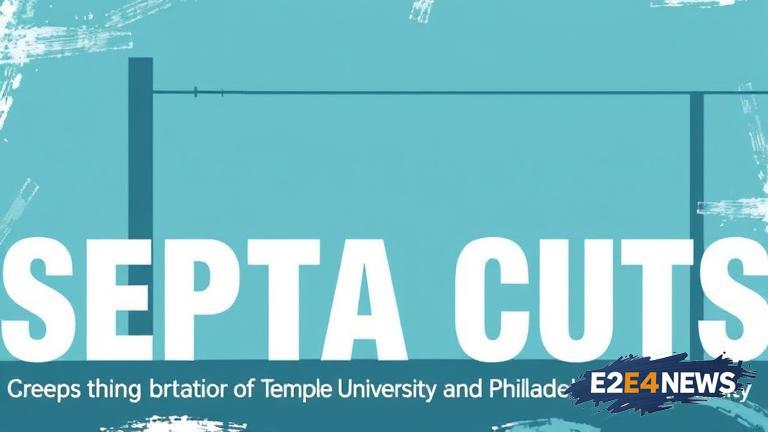The Southeastern Pennsylvania Transportation Authority (SEPTA) has announced significant cuts to its services, leaving many Temple University students and faculty members worried about their daily commute. The cuts, which aim to reduce costs and optimize routes, have sparked debates about the impact on the community. Temple University, located in North Philadelphia, relies heavily on SEPTA for transportation, with many students and staff using the buses, trolleys, and subways to get to campus. The reductions in service are expected to affect not only Temple University but also the surrounding neighborhoods, making it more challenging for residents to access essential services, jobs, and education. The cuts include reducing the frequency of buses and trolleys, eliminating some routes, and modifying others. This will undoubtedly cause inconvenience to commuters, who will have to adjust their schedules and plan their trips more carefully. Some students have expressed concerns about the potential impact on their academic performance, as they may have to spend more time traveling to and from campus. Others are worried about the safety implications, as they may have to walk longer distances or wait for longer periods at bus stops. The SEPTA cuts have also raised concerns about the economic impact on local businesses, which rely on the university and its students for revenue. Temple University officials have acknowledged the concerns and are working to find alternative solutions, such as increasing the frequency of the university’s own shuttle services. However, this may not be enough to mitigate the effects of the SEPTA cuts, and students and faculty are calling for more to be done to address the issue. The SEPTA cuts are part of a larger trend of reducing public transportation services in the United States, which has been attributed to declining funding and increasing costs. This has sparked debates about the importance of investing in public transportation and the need for sustainable funding models. In Philadelphia, the SEPTA cuts have highlighted the need for a more comprehensive and integrated transportation system, one that prioritizes the needs of commuters and the community. As the city continues to grow and develop, it is essential that transportation services are adapted to meet the changing needs of residents, students, and businesses. The SEPTA cuts have also raised questions about the role of public transportation in promoting social equity and mobility. By reducing services, SEPTA may be inadvertently exacerbating existing social and economic inequalities, making it more difficult for low-income residents and students to access opportunities and services. In response to the cuts, community groups and advocacy organizations are calling for increased investment in public transportation and more transparent decision-making processes. They argue that SEPTA should prioritize the needs of commuters and the community, rather than solely focusing on cost-cutting measures. As the situation continues to unfold, it is clear that the SEPTA cuts will have far-reaching consequences for Temple University, the surrounding community, and the city of Philadelphia as a whole. The university and local authorities must work together to find solutions that prioritize the needs of commuters and promote a more sustainable and equitable transportation system. This may involve exploring alternative funding models, increasing investment in public transportation, and implementing more efficient and effective services. Ultimately, the SEPTA cuts serve as a reminder of the importance of prioritizing public transportation and the need for a more comprehensive and integrated approach to transportation planning. By working together, we can create a more sustainable, equitable, and efficient transportation system that benefits everyone, regardless of their background or socioeconomic status.
